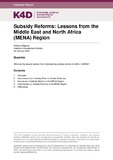Subsidy Reforms: Lessons from the Middle East and North Africa (MENA) Region
Abstract
Subsidy reforms in the Middle East and North Africa (MENA) region have concentrated on changing fuel prices and electricity tariffs. Conversely, food subsidy reforms have received less attention, reflecting the comparatively small fiscal cost of food subsidies and their high social sensitivity. While countries’ experiences have common characteristics, they differ in terms of preparation, scope of reform, and speed of adjustment. This rapid review looks at different types of pertinent literature – including reports issued by multilateral financial institutions that are usually major proponents of subsidy reforms (e.g. IMF and World Bank); international development agencies that are often interested in supporting the design and implementation of social protection schemes that will be complementary to subsidy reforms; relevant government agencies, as well as some academic publications. The report is structured as follows. Section 2 briefly discusses the key lessons from various countries on subsidy reforms (e.g. fuel subsidy, electricity subsidy, food subsidy). Particularly, the section discusses the potential gains from successful subsidy reforms; how periods of ‘crisis’ can be opportune moments to carry out reforms – instead of just being periods of challenge; and why social protection policies are needed to mitigate the adverse effects of such reforms on the poor. Section 3 briefly deliberates on the key issues in subsidy reforms in the MENA region – including their considerable fiscal burden to governments; their inefficiencies in benefiting the poor; and how they create market distortions. Importantly, Section 4 presents case studies of subsidy reforms in Egypt, Jordan, Mauritania, Morocco, and Yemen.
Citation
Megersa, K. (2020). Subsidy Reforms: Lessons from the Middle East and North Africa (MENA) Region. K4D Helpdesk Report 749. Brighton, UK: Institute of Development Studies.Is part of series
K4D Helpdesk Report;749Rights holder
© DFID - Crown copyright 2020Collections
- K4D [937]

